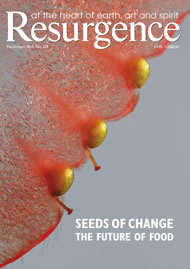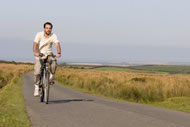I grew up under what I call the “environmental umbrella”. A child of the editors of Resurgence, I was surrounded by the ideas of the environmentalists of the 1970s and 1980s. Listening at the dinner table to visitors, from John Seymour and Leopold Kohr to Herbie Girardet and Russell Means, I sensed the importance of the issues from their tones, passion and laughter.
Gardening courses, milking the cow, mountain walks and homemade butter were joyful things for a child to grow up with. Woven throughout was a thread of words on philosophy, spirituality, society, peace and Mother Earth. Environmental awareness was my world, and it was not until my teens that I began to understand, little by little, that there were other ways of viewing the world. But to me none of them seemed to do as well at achieving what I saw as life’s real purpose: the pursuit of joy.
From the age of ten to sixteen, I attended The Small School in Hartland, an independent secondary school which set out to embody Resurgence principles. Those early years were such fun. Colin, our head teacher, would begin a Monday morning by asking us what we wanted to learn and then how we were going to arrange classes in the multitude of subjects we proposed, from Sanskrit to sword-making. It was only later, at A level college, that there were painful days of realisation that the world was in a considerably worse state than I had thought. On those days, my friend Will would smile at me compassionately – he already knew.
But I had already picked up many gems of guidance: Gandhi reckoned you should only work four hours a day for a living and then live within those means. That sounded nice and relaxed to me, so after university and a year in Finland, I returned to Hartland, took up the post of marketing manager of Resurgence and rented a small cottage on the north side of the village.
While at university I had sampled all those convenience meals that look so sumptuous on the package and found them a horrible disappointment. To maintain my standards I was going to need a lot of time for cooking, and (it soon became apparent) for washing muddy vegetables because these were the only ones that came up to scratch on taste.
My parents had not instilled in me the Protestant work ethic. In fact, they never told me anything about how I should think or view the world except when I asked questions. So, as far as I was concerned, life was about maximum joy, whether this meant sex, drugs and rock ’n’ roll or washing my own veg. I tried and crossed off all the alternatives one by one, ever searching for a maximum joy that you didn’t have to pay back in the morning.
When it came to the environment, I considered that I knew the theory. I decided that my role was to put it into practice. James Lovelock had spelled out quite clearly that CO2 was a problem and, with A level physics, I understood him perfectly. I also found, as I monitored my days for joy levels, that those whole days which passed without me getting into my Talbot Horizon actually had a better feel to them. Something to do with being in a small metal box and the passive, restrictive feeling, compared to the strength, power and exhilaration I felt on a bicycle, shooting down Ford Hill to arrive at the Resurgence offices on a muscle-toned endorphin high. Before long I was planning my weeks to increase the number of car-free days.
So what is my life today like? Well, my food comes from three main sources: bulk dried wholefoods, vegetables from the village market garden (for ten months of the year), dairy products from the village shop (not especially low-carbon but I avoid having to drive), and the occasional fish straight from the beach. This local fare is the best I have ever eaten. I look for work within a five-mile radius so that I can use a car-share to drop off my tools and then cycle or take the bus. I have installed twelve inches of insulation in my loft, secondary glazing on the windows and, by using other preserving methods, have got rid of my fridge. Every six weeks or so, I travel to London by train for meetings and to see my grandmother, and once a year I go to the continent by sleeper train – I love it! I have found that every choice I make to cut my carbon footprint not only leaves me healthier and happier but dramatically improves my quality of life.
But, you may ask, what about luxuries? It seems that everything we do makes carbon, so how can you go on holiday or drive to visit friends and family and not feel guilty about it? OK. The aim is not to cut your carbon footprint to zero overnight, but to reduce it annually by a percentage. I suggest a target of 4% per year, which will achieve the required 80% cuts by 2030 – well ahead of global targets. Start by calculating your current carbon footprint using the free Resurgence Carbon Calculator (www.resurgence.org/carboncalculator) and whatever it is, don’t feel guilty about it!
Most people have developed their lifestyles without knowing about carbon emissions. (Only since 2007 have media and public opinion shifted to the general view that climate change is happening.) And don’t feel you need to tell anyone your footprint. Nobody asks you for your bank balance. If anyone does ask, tell them it’s none of their business but you’re cutting it by 4% per year. I’d be impressed. Remember, too, that the higher your footprint is, the more good you are doing in reducing it by 4%.
Keep all the luxuries and carbon-emitting activities you enjoy, and start by cutting emissions that are dull and boring. Your carbon footprint will show how much CO2 comes from every activity, so you can start with what’s easiest for you. For some, changing the commute from car to train is easy; for others, insulating their home; for others, holidaying by train; and for others, purchasing quality, long-lasting products. But keep the fun bits. There are very few enjoyable activities that have big emissions. For example, a typical motor-racing session emits 30kg of CO2, while a boring and stressful commute of forty miles a day by car emits around three tonnes a year. I believe that if you cut out things you enjoy from your life, you could become depressed and would probably give up trying to reduce your carbon footprint. So it is far better to know your carbon budget and work your luxuries into this just as one does with money.
Over the next few months, I will be writing a new column to show how low-carbon living really is fun, that it will leave you feeling better about yourself, and that it is much easier than you think. I will cover the five most important lifestyle areas, which are heating, transport, food, holidays and shopping. I hope you’ll join me.







